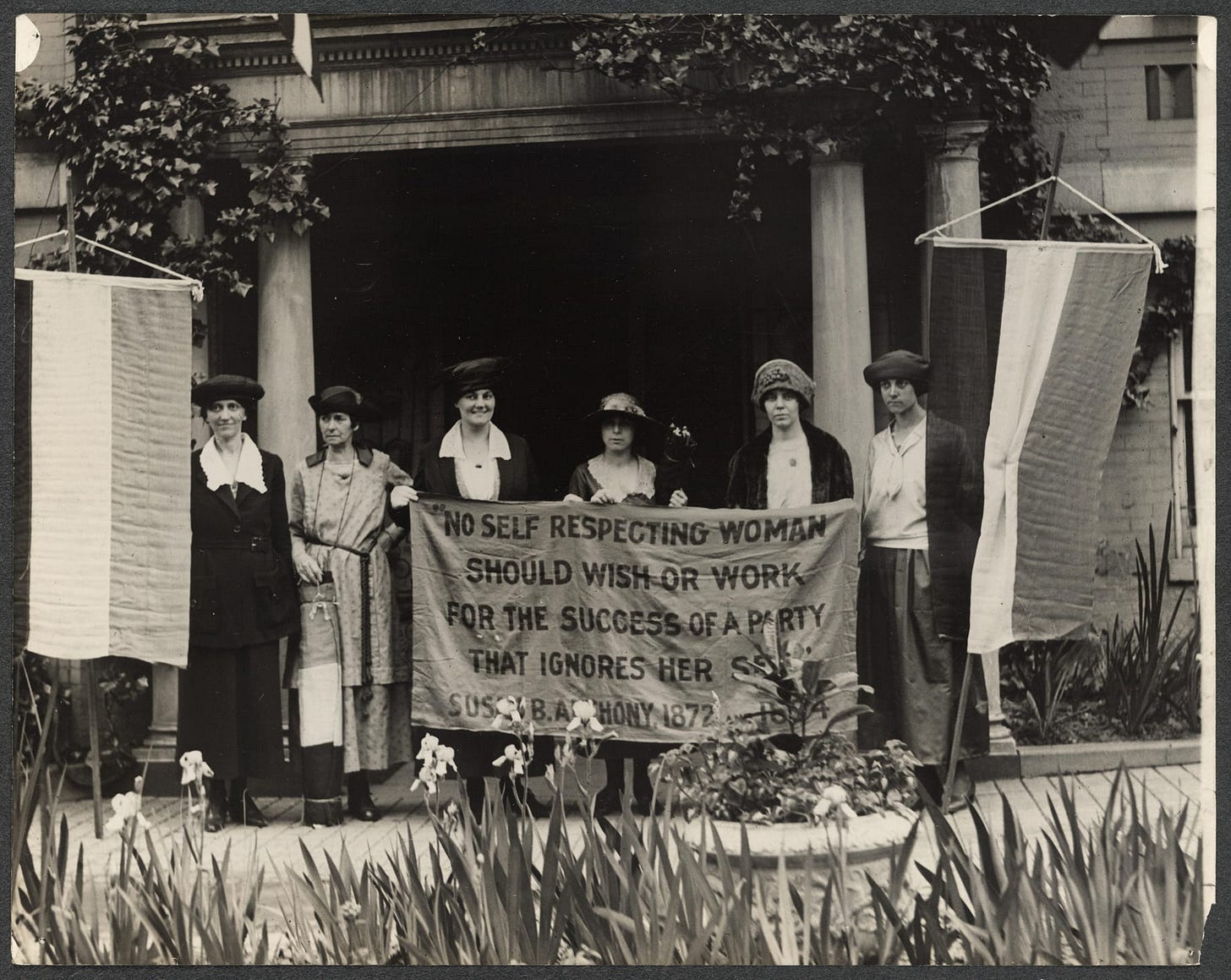Reasons to be cheerful
Standing up against trans ideology is bruising, often thankless and sometimes crazymaking. How can we stay sane while avoiding burnout?
I got an email recently from a woman who is going through something I think a lot of readers will be able to empathise with.
“I’ve been feeling more despairing than ever over the past few weeks and months,” she writes. “Women I’ve been close with since high school and college have completely bought into ‘transwomen are women’, and I’m losing them as friends… I know this sense of despair is just part of any battle for truth – but right now it all feels so daunting and hopeless. I listened to your podcast with Bridget Phetasy where you say you get up happy, and you have maintained your optimistic nature. I could use some tips.”
If you are not a subscriber to my weekly newsletter, you might like to sign up for free updates. I hope that in the future you might consider subscribing.
Rather than simply replying to her directly, I thought I’d write a newsletter in response.
Although I’m naturally a very cheerful person who wakes up every day in a good mood, and I’ve learned to be pretty good at compartmentalising, it’s obvious that maintaining one’s good humour – indeed one’s health and sanity – while battling sex-denialism is genuinely hard. Many people lose friends over this issue; some lose their livelihoods. By now, surely all of us know families that have been torn apart by a child’s trans identification, even if we’ve been lucky enough to have been personally spared. The sheer speed with which so many vital institutions have fallen to this bizarre ideology is frightening, and the more you know about it all, the clearer it becomes that winning them back won’t be quick, if it is even possible.
So how to stay cheerful? How not to become overwhelmed? How to pace yourself and avoid burning out in what is definitely going to be a long fight?
I have to start by acknowledging that it’s comparatively easy for me because I’m able to close my door on this ideology at the end of each day. I don’t have a partner or child who’s at odds with me on this, let alone one who has got caught up to the extent of adopting a trans identity. I don’t know how people manage when they see their own struggling child seduced by a snake-oil remedy that makes them feel worse, teaches them that their parents hate them and encourages them to harm themselves for life. I meet and hear from these parents all the time, and I’d be overwhelmed by their stories if I couldn’t remind myself that I’m doing all I can to help by solving the problem at a societal level. Because I can’t help everyone individually – indeed, at the individual level I can’t really do much at all. These forces are too big to battle small-scale. We can’t win by saving one child at a time.
That said, when I talk to such parents I say that they should focus on their own families, and their own mental and physical health. Their children can’t wait until we’ve got trans ideology out of the classroom and everywhere else it’s currently being pushed. Sometimes, fuelled by very understandable rage, those parents want to take on the world – fight schools, doctors, social workers and all the rest of them; start letter-writing campaigns; seek to convince everyone they know that an extraordinary and dangerous process of institutional capture is under way. Understandable as that is, it’s also often displacement activity and a distraction. I say to these parents that they should give themselves permission to focus on their own families, and their own mental health. It’s up to those of us who aren’t traumatised by our fights with state power and our fears for our own children to do that work.
Both those parents and the rest of us need sane people to talk to. X/Twitter helps, especially if you’re isolated or ill and so can’t meet others in person, but it’s not really enough on its own. What you need is at least one like-minded friend IRL, and ideally a group. Their most important purpose is to provide a safe place to use reality-based language: I sometimes wonder semi-seriously whether the purpose of the linguistic contortions of gender ideology is to drive non-believers literally mad. I’ve been talking clearly about these issues in at least some groups for years now, even when it was impossible on Twitter if you wanted to keep your account. I can still remember the feeling of relief when I started doing so. It felt like a fog had lifted from my brain.
Depending on where you are, there may be an organised group you can join. In the UK the Women’s Rights Network has lots of local groups. New members have to be vetted – infiltration is obviously a risk. If there isn’t one near you, you could start one.
There’s also a growing number of gender-critical events. Some are one-offs, like the recent launch of the “Sex and Gender Reader” at University College London last week and the screening of “Adult Human Female” at Edinburgh University on November 22nd. Others are regular fixtures, like the monthly Let Women Speak gathering at Reformer’s Tree in Hyde Park, London. And then there are the big conferences, like FiLiA, LGBA, ICONS and Genspect. I know these are expensive, especially if you have to travel and pay for somewhere to stay. But they are also sustaining. At the first Genspect conference, in Killarney earlier this year, a lot of the attendees were parents of trans-identified children seeking not only knowledge but company and comfort. I was struck by the number of attendees at LGB Alliance’s conference in October who had come from abroad.
As well as sane company, you need to feel that you are doing something to help. I’ve written before (in issue 49 of this newsletter) about the sorts of things I think have a chance of working without destroying your personal relationships or putting your job at risk: prioritising engaging with institutions over arguing with individuals; see if there’s an indirect line of attack, such as asking about whether a company or charity’s insurance will cover an incident if people are permitted to use sex-separated spaces on the basis of gender identity, and whether any risks – of being sued, for example – have failed to be reflected in the accounts and regulatory filings.
It’s both helpful and satisfying to consider where you put your money in light of support for trans ideology and alternatively sex-based rights. If you make regular donations – for example to your old university or a women’s charity, find out whether it accepts that sex is real and binary and its policies reflect that, or whether alternatively it is using your money to destroy single-sex spaces and all the rest. If the latter, stop the direct debits and write to tell them why. Say you’ll happily explain more if someone wants to call you – they may not have joined the dots between what they’ve been told is now “best practice” and the harms it’s doing – and add that when they are able to convince you that they have returned to protecting sex-based rights you’ll start donating again. In the meantime, give the money to someone else who will use it to protect women’s rights rather than destroy them. To the extent that’s feasible, do the same with money you spend.
I don’t endorse attacking these institutions (I’d make an exception for Etsy and Eventbrite, both of which platform rabid hate under the guise of trans inclusion, and deplatform the mildest gender-critical material). I think the transactivist tactics of setting up fake accounts to give one-star reviews to anyone and anything connected with gender-critical people or causes is beneath contempt. Don’t try to get people sacked, either: I’ve been at the other end of that, and it’s miserable. No, simply channel Susan B. Anthony and apply the principle broadly: “No self respecting woman should wish or work for the success of a party that ignores her sex.”
I’m intrigued by the number of women who engage in some sort of artistic or crafting activity as part of their activism. The Susan B. Anthony banner above is a particularly beautiful example; the Suffragette banner in the People’s History Museum is another. Whenever I go to events now, there are women with gorgeous, angry and funny banners, flags and t-shirts. (I always like seeing the Leeds Spinners banner: Wrong Side of History My Arse; see below.)
Making things is soothing, even if they are nothing to do with gender. In a bout of fury between my filing the first draft of my book and its publication, I knitted several scarves for women who were being attacked – if you like knitting, you may like this free pattern, which I’ve now made many times, and which looks an awful lot more complicated than it is; the only skill you need is counting. Of course, all the better if there is a gender theme: some women on protests and at events are wearing hand-knitted or crocheted Suffragette scarves; a few dress up in full Suffragette gear (below is Nicole Jones, a Scottish photographer who works with For Women Scotland; the dress is vintage, not reproduction).
Some artistic activism is quirkier. There’s a woman who paints gender-critical slogans on pieces of slate, puts them in interesting places and posts the photographs on Twitter. Another paints on stones: she sent the Sex Matters team a whole set before our most recent board meeting. Here’s a picture of the one I chose – one of my favourite quotes. I keep it on my bedside table.
Others are part of book groups that sustain each other. Eliza Mondegreen, hands-down one of my favourite writers and thinkers on the current madness, runs an online book group as part of her Substack, Gender:Hacked. JKR’s Barmy Book Army was born out of a few friends’ bout of rage at whatever the latest insanity was; it now schedules tweetstorms (or whatever we’re meant to call them now that Twitter is X) on each book, in which the author answers questions. It also does in-person meet-ups; after they invited her, not remotely expecting her to take up the offer, JK Rowling herself turned up to one.
THE TERF WHO CAME TO TEA
This weekend the brilliant, brave, and hilarious @jk_rowling hit up Barmy Book Club HQ. We laughed until we cried and smiled until our faces hurt. We ate Tunnock’s teacakes. We drank a lot of tea. And we talked about EVERYTHING. pic.twitter.com/icpChYhzcH— JKR's Barmy Book Army (@JKRsBarmyBooks) June 12, 2022
I think we all have to pace ourselves. This isn’t remotely going to be over by Christmas – not this Christmas, and not for many Christmases to come. It’s been decades since doctors started telling patients they could take hormones and have surgery and everyone else would then play along with the notion that they had changed sex; and decades since laws and bureaucracies started that accommodation process. The world is now very far along a path it should never have started along, and it’s going to take a long time even to slow the momentum that movement has behind it. A lot of things are going to have to be unpicked, and I fully expect that I’ll be doing this as long as I’m capable of working.
So no one can possibly do more than a tiny part of what’s needed. Pick your bit and stick patiently to that. I don’t know how much use the people knitting socks and scarves, or growing vegetables in their gardens, were during the second world war, but presumably their efforts added up to something meaningful – and I’m certain that they felt better for it.
You need to keep your eyes on the next task, and only very rarely look up to think about the immensity of the task, and the unreason and malice behind the opposition. If you’ve ever decided to get fit, or to learn an instrument as an adult, you may have been told that you should look behind you to see how far you’ve come, and resist looking forward to see how far you still have to go. That’s excellent advice, and particularly applicable at this moment to the fightback against trans ideology: if you think where we were, say, five years ago, it’s obvious a lot has been achieved. But it’s still daunting to think how much more there is to do.
It helps to see the humour in it all. It’s obviously a disgrace that women who’ve worked hard and sacrificed a lot should lose out on sporting glory – but the sight of Lia Thomas or Laurel Hubbard or any of the other delusional, preening narcissists standing on the podium is also objectively hilarious, in a very “emperor’s got no clothes” way. I don’t think I’ve ever shown one of those pictures to someone fresh to the topic without them bursting out laughing. These men should be ashamed of themselves, but instead they’re being praised. They deserve pointing and laughing. They’re clowns – admittedly malignant ones, but still clowns.
I feel a danger in this too, though. I don’t think I was ever in Camp BeKind, but I certainly used have a lot more empathy with people I thought of as having the rare and difficult condition of gender dysphoria. Now, I find it hard to hold onto that because I’m so aware of the enormous costs accommodating them has imposed on everyone else, and the incredible self-centredness of thinking that the rest of us must accept being co-opted into their treatment plans. I worry a bit that having lost sympathy, the humour can turn into something nastier. I don’t think I’m there yet – and to be clear, I don’t think there’s anything remotely funny in the young people caught up in this, not even black humour; I’m talking about the blokes prancing around in women’s sports, or saying they’re “gender-fluid” and coming to work in fishnets and pink satin on the woman days (see Pips Bunce above)… Not just enraging, also hilarious.
You’ve got to reduce your exposure to the endless stream of lies and trolling directed at gender-critical people. I rarely look at replies to my tweets, but when I do I mute anyone insulting me or talking nonsense. And I block the really nasty people, like Freda Wallace, and anyone who sends me an unpleasant DM (this includes people on “my side”).
Some people swear by Twitter breaks. If you follow me on Twitter you’ll know that’s not me! But actually I don’t spend much time on the site: it’s how I punctuate between paragraphs when I’m writing. And then there’s the usual stuff about eating properly and getting enough exercise and sleep – clichéd, but clichéd for a reason.
I know this stuff is standard good mental hygiene, but I think it’s harder to maintain good habits when you’re caught up in this topic than it is with many others. There’s a strong tendency for it to become all-consuming, in part because it’s so insane but also because when you mess up a concept as fundamental as male/female it causes problems absolutely everywhere. But it isn’t good for you, or indeed your effectiveness, to let it seep into everything. Ideally, you’re either thinking constructively about the issue (and doing something about it), or not thinking about it at all.
And finally, think about what you’ve gained rather than what you’ve lost (again, I accept some people’s losses are too great for that; I’m so sorry).
I’ve hardened my heart concerning the people I’ve lost. This took a conscious decision – they include some people I really cared about. I also lost a political standpoint. I used to think of myself as a technocratic centrist, which has made my radical loss of faith in the institutions of liberal democracy particularly painful, and actually quite embarrassing. But I have gained so much. It’s not that common to make a lot of new friends and to find an engrossing new purpose in your middle age. I’m proud that I’m still learning and gaining new skills: I’ve done more new things in the past three years than in any since I first left home. I think I’m lucky that every day I get up knowing that there’s important work to do, and that I’m making a difference. As for the losses – well, there’s a certain grim satisfaction in no longer being so damn naive.
If you would like to become a paid subscriber and receive full access to my weekly newsletter, you can sign up here.
If you have more suggestions of ways to stay cheerful while fighting this fight, please add them in the comments!







“I’m so angry and depressed now” is an issue that comes up not-infrequently in TERF forums. I’m glad this post is in front of the paywall now, so I can share it any time!
Many thanks, Helen! This is very helpful. I'm also relieved to learn that you appear to be taking good care of yourself. As a 50 year old gay man, I've been doing my best to introduce the dangers of trans ideology to friends and family who have perceived this to be a fringe issue affecting only a tiny percentage or trans identified people and so have not given it much thought. When they realise that the safety and rights of all women and girls are under threat, and that the gay rights that they championed are facing a likely backlash and rollback in the near future, they begin to take an interest. I'm so grateful that we have your book and many brilliant articles and podcast interviews to send them to introduce them to the dangers. 🙏🏼